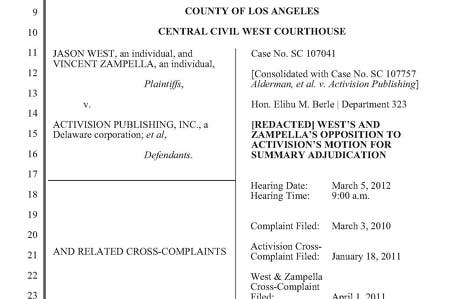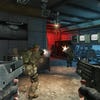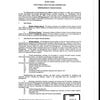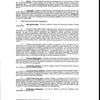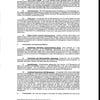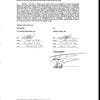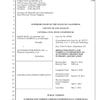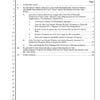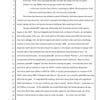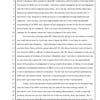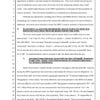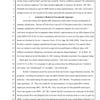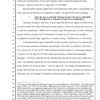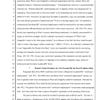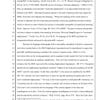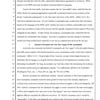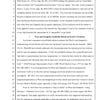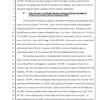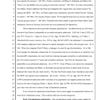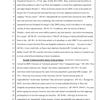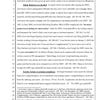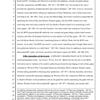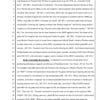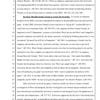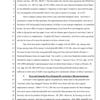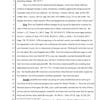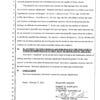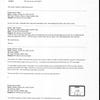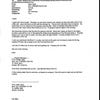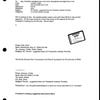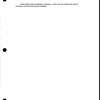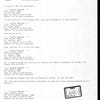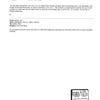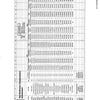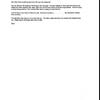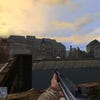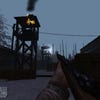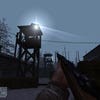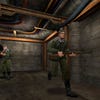Activision vs. Vince Zampella and Jason West: Inside the game industry trial of the decade
Why the sacked Infinity Ward founders want $1 billion, and how they intend to win it.
As bona fide stop-the-press moments go, the events of 1st March 2010 stack up impressively. With Modern Warfare 2 smashing sales records across the globe and cementing the Call of Duty brand's claim to 'biggest gaming franchise ever' status, Activision announced out of the blue that its creators, Infinity Ward co-founders Jason West and Vince Zampella, had been relieved of their posts with immediate effect.
What on earth could have prompted the publisher to get rid of the two men responsible for its steamrolling multi-billion dollar FPS cash cow? Next Tuesday, after more than two years of legal pre-amble, the relevant parties will gather in a Los Angeles court room to establish exactly that, decide who did wrong by who, and at what cost.
With a billion dollars in damages potentially at stake, not to mention the reputations of some of the biggest players in the video game industry, it promises high drama, Machiavellian corporate intrigue and, surely, a whole lot of name-calling.
Seeing as a steady stream of complaints and cross-complaints have muddied the waters in the months since the original dismissal, Eurogamer has sifted through the available legal documentation and spoken with key players and commentators in an effort to offer an everyman's guide to what exactly the case is all about, and what the outcome might be.
First things first, here are the facts. As aforementioned, Zampella and West were fired by Activision on 1st March 2010. On 4th March, the pair filed a lawsuit against their former employers alleging they were the victims of wrongful termination and were owed around $36 million in unpaid royalties. As they saw it, Activision's behaviour amounted to "astonishing arrogance and unbridled greed".
Activision immediately responded, labeling the pair's allegations "meritless". Then, on 8th April, it filed its own counter-complaint detailing exactly why the duo had been terminated.
"In certain respects, West and Zampella were valuable executives at the company," read Activision's claim, before adding, "West and Zampella morphed from valued, responsible executives into insubordinate and self-serving schemers who attempted to hijack Activision's assets for their own personal gain".
We'll look at the various specific accusations the publisher makes in greater detail later, but one of its central complaints was that Zampella and West held clandestine meetings "with the most senior executives of Activision's closest competitor" with a view to taking their talents elsewhere.
Of course, that turned out to be true. A few days after Activision filed their legal documents, Zampella and West announced they had set up a new studio called Respawn Entertainment and signed a deal with Electronic Arts - the same publisher for whom the pair had made their name developing Medal of Honor: Allied Assault.
That revelation duly prompted Activision, as of December 2010, to drag EA into its legal claim too, demanding $400 million in damages from the rival publisher.
The various parties have spent the last 18 months lining their ducks up and jostling for position, but now, at last, things are starting to happen. Firstly, EA and Activision announced last Wednesday they had settled their disagreement out of court.
All we know about what transpired is a joint statement from the two publishers that read, "Activision and EA have agreed to put this matter behind them." However, the industry consensus appears to be that EA probably came out on top.
"You're allowed to talk to people who are currently employed. Pretty much every person I've ever hired was employed - you can't expect the worker to take the risk that they'll be unemployed while looking for work. So Activision's lawsuit against EA made no sense at all."
Michael Pachter, Wedbush Morgan Securities
"Clearly Activision isn't getting any money from EA," speculates Wedbush analyst and former lawyer Michael Pachter.
"Their lawsuit was stupid. If you're the biggest star in the games industry and you say 'My contract is up in November and I'd like to come and work with you in December,' what would EA say? Wait until October and call us back? No.
"You're allowed to talk to people who are currently employed. Pretty much every person I've ever hired was employed - you can't expect the worker to take the risk that they'll be unemployed while looking for work. So Activision's lawsuit against EA made no sense at all.
"They'd already delivered the product they were contracted to deliver. The only argument Activision might have had is that by talking to them in March somehow that might have diminished the quality of downloadable content for Modern Warfare 2 that hadn't yet been released. That's a big stretch though."
West and Zampella's attorney, Robert Schwartz of O'Melveny & Myers LLP, speaking in an interview with Eurogamer, suggests that Activision's suit against EA was cynical and calculated from the outset.
"The EA thing was a PR move and a shakedown, and goes to show what an awful, awful group of executives Activision has," he says, without a trace of ambiguity.
The next significant update followed 24 hours later when Activision, via an SEC filing, revealed that Zampella and West's initial $36 million damages claim had since rocketed to over $1 billion.
According to Schwartz, that original $36 million was the estimated value of the bonuses that the pair was entitled to for the launch quarter of Modern Warfare 2 at the time that they were dismissed.
On top of that $36 million, Schwartz argues they're also entitled to multiple additional bonuses for Modern Warfare 2 and "and other games in the Call of Duty family that they worked on before they were fired and that came out after they were fired and through the time their contracts would have expired in November 2011".
West and Zampella insist that both Modern Warfare 3 and Treyarch's Call of Duty games fall under that umbrella. Yes, you read that correctly - Treyarch's titles too.
"The contract gave them bonuses on all Call of Duty-branded games," explains Schwartz.
"Activision doesn't dispute that. World at War, Black Ops - they were entitled to be paid bonuses on those games. For the first year that World at War came out, Activision did actually pay them bonuses on it.
"They're entitled to a bonus for any game that uses their technology, and they provided a game engine to Treyarch. Treyarch were not capable of making an engine on their own so they took the Infinity Ward engine and used it in World at War, Call of Duty 3 and what-have-you. There's no controversy here."
According to the Zampella and West legal team's arithmetic, those additional bonuses add up to another $250 million.
Further adding to the total is testimony from one of Activision's own experts that Modern Warfare 3 would have earned another $150 million at retail if Zampella and West had made it, as it would have been a superior game to the product that eventually shipped.
Another piece of the puzzle, and potentially the most expensive for Activision, concerns a clause in their contract that gave the pair "creative authority" over both the Modern Warfare IP and any Call of Duty game set either after Vietnam, in the near future or in the distant future.
Schwartz estimates the loss of this creative control to be worth "$200 million on the low end and over $700 million on the high end".
And for the icing on the cupcake, their lawyers will point out that a court-appointed independent expert found irregularities in Activision's accounting. The effect that has on Zampella and West's potential remuneration adds up to "a couple more million".
"Take all those pieces into account, and the possibility of punitive damages as we have a fraud claim, the value actually does exceed a billion dollars," says Schwartz.
"I'm not saying that's what the jury would award, but that is the basis for the damage calculation crossing the billion-dollar line."
Much of this hinges on whether Zampella and West can prove Activision fraudulently dishonoured their contract by deliberately conspiring to dismiss the pair without proper grounds.
In 2008, Zampella and West signed a new contract (see exhibit A below or download the PDF) with Activision in which they agreed to take a reduced royalty rate of 20 per cent, down from 35 per cent, in exchange for creative authority over the series - an almost unprecedented concession from a major publisher.
The same contract included a clause stating that all agreements relating to this and any future bonus payments would be nullified in the event that both Zampella and West no longer worked at Infinity Ward. In their fraud claim (see exhibit B below or, again, download the PDF), the former Infinity Ward bosses claim West underlined that section and annotated it "No fired" out of concern that Activision had given itself an easy exit strategy.
Both he and Zampella took their concerns to Activision CEO Bobby Kotick in March of that year, who apparently responded, "Don't worry about it. It's impossible for you guys to get fired." He then offered further reassurance, saying, "You're in the big leagues now."
The pair alleges this was a lie, and that Kotick and Activision never intended to honour the contract. They'll attempt to prove this with a string of email communications between Activision executives (see exhibit C below, or download a zipfile of the PDFs) discussing plans to get rid of them well in advance of their eventual dismissal.
They'll also present depositions made public last week suggesting Activision's chief lawyer George Rose asked former IT chief Thomas Fenady to hack into the pair's emails in search of dirt which it could use to get rid of them.
On top of that, we'll also hear evidence detailing a conversation that allegedly took place between freshly appointed Infinity Ward chief Steve Pearce and Todd Alderman and Richard Baker, two veteran Infinity Ward employees appointed to act as intermediaries between remaining staff and new management in the weeks immediately following Zampella and West's departure.
When asked by the pair to divulge the real reason the former IW bosses were sacked, Pearce supposedly replied it was because "the deal [Jason and Vince] made was way too good" and, "Activision didn't have any control of Modern Warfare so they couldn't make Modern Warfare 3, which would be the sequel to Modern Warfare 2, [which] was the hugest game ever and that [West and Zampella] virtually had a gun to Bobby's head when they signed this contract."
"There's no way Bobby was ever going to honour this contract," said Pearce, allegedly.
In a later conversation Pearce reportedly added that Zampella and West had "signed their own death warrant" when they signed the contract.
Pearce was apparently chided by colleague Steve Ackrich at the time for "talking too much", to which he responded, "If I'm depositioned [sic] on this any time later I'm just going to deny it." Zampella and West's legal team claimed that, as of 17th February this year, they had been unable to question Pearce about this conversation as Activision had twice postponed his deposition.
West and Zampella also hope to prove that Activision had no intention of honouring the contract by demonstrating how quick the publisher was to breach it. They claim it didn't ask permission for Treyarch to use Modern Warfare assets in its World at War game, as they argue the agreement dictated. Similarly, it didn't tell West and Zampella it had tasked Treyarch with porting Modern Warfare to the Wii, or that it had encouraged the studio to develop Black Ops, despite the fact that IW had to sign off on any Call of Duty title set post-Vietnam.
And on top of all that, they claim Activision authorised a third studio, Sledgehammer (who would later go on to co-develop Modern Warfare 3), to start work on two spin-offs, tentatively titled "COD Future Warfare and COD 2051" - both of which would clearly contravene the 'no future-set COD' line in their contract.
"This was a plan to get rid of them, not pay them their money and take back their creative control, which they sold in 2008 and never wanted to honour," insists Schwartz. "It's eye-popping when you look at the documents and testimony."
So, what does Activision have to say in its defence? Was it justified in sacking the pair, or was Kotick really just sore about that contract all along?
As Schwartz sees it, the publisher's list of complaints against the pair constitutes "a lot of ticky tacky stuff that in my mind doesn't add up to anything real". Well, let's have a look.
According to Activision's April 2010 legal complaint, they're accused of "belittling and demonising executives at Activision and other Activision-owned game development studios with the specific intention of alienating IW employees from Activision".
Expect a well-publicised incident from 2008 to rear its head, where Infinity Ward community manager Robert Bowling displayed questionable professionalism by publicly labeling Activision marketing man Noah Heller "Senior Super Douche".
Schwartz adds that Zampella and West are also accused of being disrespectful to people in Activision's marketing department by calling them liars - which, he insists, "they were".
Activision also claims the pair engaged "in insubordination in support of their efforts to identify the Modern Warfare franchise solely with Infinity Ward". Relating to this, Schwarz notes that Activision was particularly "upset" that West removed its spinning logo from Modern Warfare 2's start-up screen.
As already stated, Activision's fury over their EA meetings was another key reason in why they were fired. "They met and had conversations where they talked about working together in the future. Bobby Kotick sees that as treasonous," comments Schwartz. "They then supposedly lied about it, which is totally false - they admitted it completely and repeatedly."
It also claims that Zampella and West withheld bonus payments from staff and blamed it on Activision, making it easier for them to poach employees when it did eventually make the break for EA. It's worth noting here that around 40 Infinity Ward staff did in fact jump ship to Respawn soon after the new studio was set up.
Finally, Activision argues that the pair held future Modern Warfare games hostage until "Activision acceded to their demands that were incompatible with their contractual agreements to Activision and their fiduciary duties to the company".
Early last week, Activision agreed to a pay out $42 million to a group of Infinity Ward employees - presumably including Zampella and West - seeking their share of the profits from Modern Warfare 2. It was stressed at the time that this did not constitute a settlement or an admission of guilt on Activision's part. However, Schwartz sees things a little differently.
"To me it's an admission by Activision that they're in the wrong, and they're just trying to manipulate the jury by two weeks before trial paying out this money," he explains.
"They didn't pay them all the money they were entitled to either. It's crazy.
"We're going to tell the jury this is the Activision MO: force people to sue you, don't pay them, drag them through depositions, make them spend money on lawyers and then, right before you have to answer for your conduct in front of a jury, try and pay them off with hush money.
"It will bear on the case and give the jury an even clearer impression of how horrible Activision is."
While this might all sound very compelling, it is of course only one side of the story. Eurogamer has also discussed the case with Activision's lawyers; however, they declined to go on-record. Suffice to say they'll present a very different - and equally persuasive - version of events when the trial gets underway next week. They'll also be seeking substantial damages, should they win, though have not publicly announced a figure.
Only time will tell who will come out on top but, for what it's worth, Pachter believes Activision will likely be cutting Zampella and West a cheque at some point in the near future, though probably for considerably less than a billion dollars.
"I really believe Activision owed them money, because the event that gave rise to the bonus payment was delivering Modern Warfare 2, which they obviously did. I'm sure there were all sorts of other things - Metacritic scores and sales and so on - but it clearly exceeded them," he says.
"They weren't fired because they made a bad game, they were fired because they were talking to EA. I think they have a pretty good case for getting paid. I think a billion is a crazy number and makes no sense at all. I think West and Zampella saying they own the Call of Duty brand is crazy.
"I think West and Zampella win, and I think Activision's argument is a big stretch. They were talking to EA because at the end of their contract they were thinking of moving to EA, which is their prerogative. At the end of their contracts they're free agents.
"Activision's legal argument is that EA isn't allowed to talk to them until their contract expires, which I think is completely wrong," he continued.
"I think that has no legal basis at all. You are permitted to talk to prospective employers while you're with your current employer. If your current employer finds out, they can fire you, which Activision did, but there's no ground for a lawsuit. It doesn't make sense."
Senior DFC Intelligence analyst Jeremy Miller, who previously worked at Infinity Ward as a producer prior to the release of the original Modern Warfare, speculates that we may never know exactly how much money will change hands.
"Most of the time these things tend to settle for an undisclosed amount," he tells Eurogamer. "If that happens in this case, it's put to bed and everyone goes home. Activision takes a one-time charge, probably significantly less than a billion, and they roll on. Everybody goes about their lives, and Jason and Vince go back to making their game at Respawn."
Whatever the outcome, the true victors will likely be both sides' huge legal teams, as well as industry onlookers rubbernecking for some juicy courtroom drama. Should things get really ugly, the loser, on the other hand, could end up being the gaming business at large.
"I think it will be long and slow and there'll be a lot of dirty laundry aired. I think there's going to be name-calling and I think it will be sad for the industry," predicts Pachter.
"I get the tensions between the publisher and the developer. The publisher wants to do everything fast and at low cost but still at extremely high quality, while the developer wants a lot of time and money. But I do not think it should ever denigrate to this."
